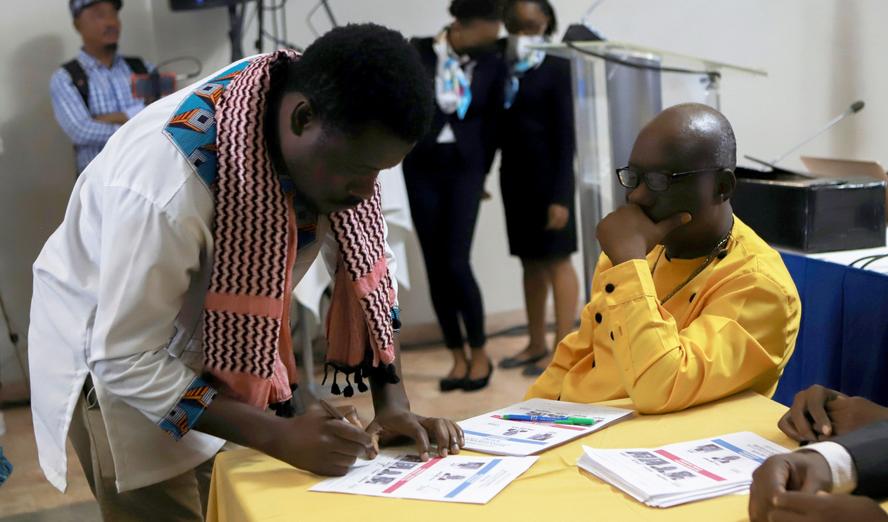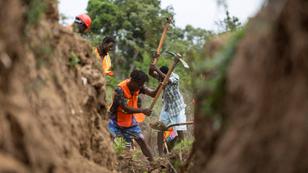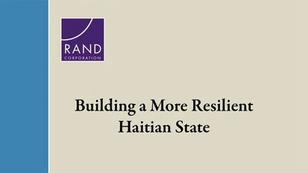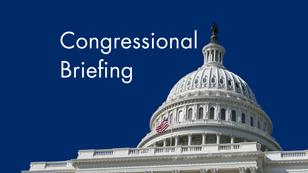The recent ousting of yet another Haitian prime minister, Gary Conille, over the weekend highlights the urgent need for U.S. policymakers to reassess their approach to foreign policy in Haiti. For over a century, the United States has played a significant role in Haiti's affairs, beginning in 1915 with the deployment of marines after the assassination of the country's president. These 109 years of involvement have fostered a reliance on U.S. aid in Haiti that has persisted for well over a century. Yet, Haiti's most recent political upheaval, the ouster of Conille, following the 2021 assassination of President Jovenel Moïse, may provide an ideal opportunity for the United States to rethink its role in the Caribbean nation's affairs.
The timing is crucial: Gangs control most of the capitol city of Port-au-Prince and large swaths of the countryside, millions are in dire need of continuous humanitarian assistance (PDF), and tens of thousands of Haitian migrants have arrived in the United States over the past decade. Moreover, the illicit flow of drugs, arms, and human trafficking between Haiti and the United States underscores the national security implications of the crisis, making it not just a regional issue, but one that impacts U.S. homeland security directly.
The country has not held true elections in nearly five years, and the candidates presented to the Haitian public are often selected with minimal input from Haitian civil society. Instead they are imposed by external forces (as was the case with recently ousted Prime Minister Conille). Even the most recent transition government, established after President Ariel Henry was removed from office in April 2024, was put into place by the United Nations, the Caribbean Community (CARICOM), and representatives from other nations including Brazil, Canada, France, Mexico, and the United States. Despite efforts by Haitian civil society to develop plans for a transition to free and fair elections—most notably through the development of the Montana Accord, signed by over 70 cooperating civil and political organizations—such initiatives have been largely ignored by the international community.
Despite efforts by Haitian civil society to develop plans for a transition to free and fair elections, such initiatives have been largely ignored by the international community.
U.S. policy may feel compelled to intervene or blindly continue providing aid to Haiti in an attempt to address the country's challenges. However, this approach has, ostensibly, often unintentionally undermined Haiti's ability to address its own challenges from within. Decades of foreign aid have distorted Haitian institutions, making them more responsive to the interests of international benefactors and local elites than they are to the needs of the broader Haitian population.
So what, then, should the United States do—particularly at this current and crucial juncture?
First, the United States should focus on curbing illicit arms transfers, and other destabilizing drivers emanating from the United States and fueling instability in Haiti. Arms trafficking from the southeast United States has helped fuel the burgeoning gang epidemic in the country, enabling gang violence to reach its current unprecedented levels. The United States should consider prioritizing weapons interdiction by sea and air to better diminish gang access to illicit arms trade.
Next, the United States should refrain from interfering in the selection of future Haitian leaders. Instead, it should work to create the conditions for genuinely free and fair elections. Past efforts to facilitate elections in Haiti have often promoted candidates aligned with U.S. interests or international organizations like the United Nations, leading to policies that run counter to the desires of most Haitians. The State Department's U.S. Strategy to Prevent Conflict and Promote Stability 10-Year Plan for Haiti (PDF) includes a commitment to “deepen engagement with Haitian civil society, including religious groups and NGOs, as well as other international donors, Haitian diaspora organizations, and multilateral organizations” to “respond to and incorporate lessons learned from decades of interventions in Haiti.” This is a commendable goal, and should be pursued earnestly in the years to come. Haitian civil society has long felt excluded from decisions about Haiti's future, and when civil society organizations do reach consensus on their political plans, such as through the Montana Accord, such efforts have largely been disregarded. The United States should trust Haitians to manage their own internal affairs, and support initiatives that have genuine backing from within Haitian society.
Another critical step the United States can take is to shift its approach from simply providing aid money to offering loans or conditional financial assistance instead. Aid money, while often well-intentioned, has a history of fostering corruption, and resulting in the misallocation of funds. When money is given without expectation of repayment, it can be easier for it to be squandered or diverted to the benefit of a few, rather than serving the broader population. On the other hand, lending money or providing conditional financial support creates an incentive for more judicious use of resources, as the funds will need to be repaid.
The United States should trust Haitians to manage their own internal affairs, and support initiatives that have genuine backing from within Haitian society.
Such an approach encourages accountability and can help ensure that financial assistance is directed toward projects that have the potential for sustainable impact, rather than being lost to inefficiency or graft. By tying financial support to specific goals and outcomes, the United States can help foster a more responsible and transparent use of funds, ultimately contributing to a more stable and self-reliant Haiti.
Finally, the United States should prioritize the wealth of knowledge and resources that exist within the Haitian diaspora. There is a groundswell of highly educated Haitian expatriates who are deeply invested in their country's future, and who possess the expertise and means to drive meaningful change. These individuals have identified both the persistent challenges Haiti faces as well as the potential solutions for self-governance and sustainable development. By empowering the Haitian diaspora to lead and contribute to Haiti's recovery, and by fostering collaborations that genuinely prioritize local leadership, the United States can help facilitate a new era of Haitian resilience and autonomy, rather than continuing to perpetuate its more than century-long cycle of dependence.





